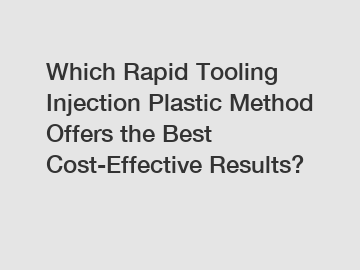Dec. 22, 2023
Hardware
Which Rapid Tooling Injection Plastic Method Offers the Best Cost-Effective Results?
Rapid tooling injection plastic methods have revolutionized the manufacturing industry by enabling quick and cost-effective production of high-quality plastic parts. However, with several methods available, it can be overwhelming to determine which one offers the best cost-effective results. In this article, we will explore four popular rapid tooling injection plastic methods and discuss their advantages, disadvantages, and cost-effectiveness.
1. Conventional Injection Molding:

Conventional injection molding is the most commonly used method for plastic manufacturing. It involves injecting molten plastic into a pre-made metal mold, allowing it to solidify before ejecting the final part. While this method may offer high production volumes and exceptional surface finish, it can be expensive due to the upfront costs associated with creating the tooling molds. Additionally, the lead time for producing the molds can make it less cost-effective for small production runs. However, for large-scale manufacturing, conventional injection molding becomes more cost-effective due to economies of scale.
2. Rapid Aluminum Tooling (RTA):
Rapid aluminum tooling, also known as soft tooling, offers a compromise between speed and cost-effectiveness compared to conventional injection molding. With RTA, the molds are made from aluminum, which can be machined or cast to form the desired shape. This method is suitable for low to medium volume production runs as it allows for shorter lead times and reduced upfront costs compared to steel molds. While RTA may not provide the same level of durability as steel molds, it delivers excellent part quality and is more cost-effective for smaller production quantities.
3. 3D-Printed Tooling:
The advent of 3D printing technology has introduced a new approach to rapid tooling. This method involves 3D printing the molds directly using high-performance materials like thermoplastics or photopolymer resins. 3D-printed tooling offers several benefits, including reduced lead times, lower costs, and increased design flexibility. However, the limited durability of 3D-printed molds makes them more suitable for short production runs or prototyping rather than long-term production. Despite this limitation, the cost-effectiveness and quick turnaround time make 3D-printed tooling a viable option for many manufacturers.
4. Hybrid Metal Additive Manufacturing:
Hybrid metal additive manufacturing combines the best of both worlds by incorporating 3D printing and traditional tooling techniques. In this method, the molds' core and cavity are 3D-printed using metal additive manufacturing, while the mold base is machined from metal. This hybrid approach allows for complex geometries and reduced lead times while maintaining high durability and heat resistance. However, the cost of metal additive manufacturing and machining can be higher than other methods, making it more suitable for critical applications where quality and performance are paramount.
In conclusion, determining the best cost-effective rapid tooling injection plastic method depends on various factors. For large-scale production runs, conventional injection molding becomes more cost-effective due to economies of scale. For smaller production quantities, rapid aluminum tooling offers a balance between cost and speed. 3D-printed tooling is ideal for short production runs or prototyping, while hybrid metal additive manufacturing provides high-quality results for critical applications. Ultimately, manufacturers should carefully evaluate their production requirements, budget, and desired lead times to select the most cost-effective method that aligns with their specific needs.
If you are looking for more details, kindly visit oem rapid tooling factory, airplane parts rapid mold tools, Airplane Parts Rapid Mold Tools.
Previous: What are the advantages of tool holder?
If you are interested in sending in a Guest Blogger Submission,welcome to write for us!
All Comments ( 0 )